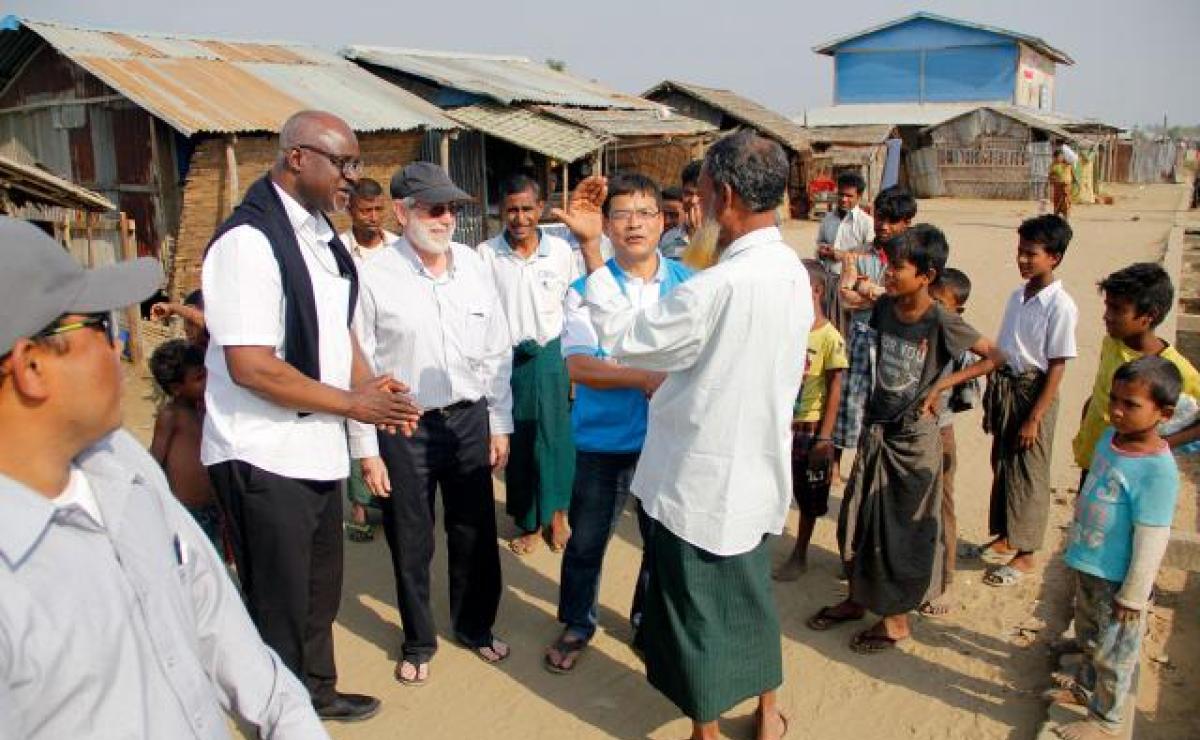“Durable and peaceful solutions” needed for displaced Rohingya

LWF World Service director Maria Immonen reflects on the situation in Myanmar and Bangladesh
(LWI) - The needs of displaced Rohingya need to be addressed in a more sustainable way, says Maria Immonen, director of the Lutheran World Federation (LWF) humanitarian and development arm, LWF World Service. In her position as Vice-Chair on the Standing Committee of Humanitarian Response (SCHR), Immonen will attend an international online donor conference to increase assistance to the displaced Rohingya on 22 October 2020. The conference is hosted by the UN High Commissioner for Refugees UNHCR), the United Kingdom, the European Union and the United States.
LWF World Service, provides humanitarian and development aid to Rohingya in Myanmar’s Rakhine state, and in Cox Bazaar, the Rohingya refugee camp in Bangladesh. In an interview with LWI, Immonen talks about the situation in the camps, COVID-19, and her hopes for the conference.
LWI: You visited an ID camp in Rakhine state at the beginning of this year. What was your impression?
Immonen: I have visited many refugees and IDP camps during my career but have to say that the living conditions in the ones I saw in Myanmar really shocked me.
The locations where the camps have been set up are far from ideal. The standards of sanitation are low. Access to clean water is rare in certain places, especially during the rainy season. These conditions have not changed even after many years of humanitarian support to the population. Basic services are not at the levels they should be, and SPHERE standards (a set of principles and minimum humanitarian standards in sanitation, food, shelter and health) cannot be implemented. More support is definitely needed.
An offshore IDP camp for Rohingya in Rakhine State, Myanmar. Photo: LWF/ M. Immonen
LWF has been working with Rohingya for twelve years, in Myanmar and since 2017 also in Bangladesh. How has the situation developed?
There continue to be sporadic incidents of continued violence between conflict parties in Myanmar, which affect the civilian population regardless of their ethnicity. Armed conflict has a serious, detrimental impact on all of the population in the country.
The Rohingya in both Myanmar and Bangladesh lack access to services and livelihoods due to their loss of freedom of movement. In Myanmar, they also lost their right to vote in the general elections on 8 November, because they lost their citizenship rights.
This impacts the affected population’s dignity as they are unable to fully live out their social, economic, cultural, civil and political rights. Host communities also struggle to make ends meet.
How has COVID-19 affected that situation?
COVID-19 has added further challenges, particularly relating to access restrictions to communities in need. Lockdowns and quarantines complicate humanitarian work and travel to the affected areas, as well as add to health and safety concerns among staff and the general population. Health services are already limited in these regions, and an uncontrolled spread of the virus in camp conditions can have extreme consequences for the population.
The LWF Committee for World Service visits a school in a Rohingya IDP camp in January 2020. Photo: LWF/ M. Immonen
What are the challenges for LWF field staff?
Staff in the field has remained on location since the pandemic started, and to a large degree have continued to provide essential and life-saving services to the Rohingya in both countries. Most of our staff is national staff, who have continued in their work as normal.
However, due to severe restrictions on movement, normal leave and vacation times have been disrupted, and even in-country travel has become increasingly challenging, leading to additional stress for all concerned. The long-term perspective of the pandemic is taking its toll on all of us.
You will attend the International Rohingya donor conference in your position as Vice-Chair of SCHR. What do you hope the conference will achieve?
My hope is that support for the long-term humanitarian needs of the Rohingya and host communities in both countries continues. It is important that member states of the UN recommit to solving the underlying root causes of the conflict and commit to supporting and enabling peace processes which respect the human rights of all people.
LWF is signing on to a statement, together with the forum on non-governmental organizations in Myanmar. What are you asking for?
We call to respect human rights, specifically for those that are marginalized or left out and don’t have access to services and protection.
LWF also calls upon Myanmar, Bangladesh, Member States and the United Nations to address the root causes of displacement and continued support for Rohingya within, and outside of Myanmar, and expand their search for durable and peaceful solutions. Without lasting peace, there is little hope for a dignified life for all.
Support our work in Myanmar
LWF is working with internally displaced communities and host community members in Rakhine, Myanmar, since 2012, providing education, protection and strengthening community-based activities to empower communities.
After the mass displacement in 2017, LWF through its former country program RDRS started working with Rohingya refugees in Cox’s Bazaar refugee camp, Bangladesh. LWF is providing livelihoods, water, sanitation and hygiene, environmental conservation and reproductive health to adolescents and youths in both refugee and host communities to improve their living situation, and promote peaceful co-existence.
The work of LWF World Service with Rohingya in Myanmar and Bangladesh is supported by ACT Church of Sweden, ALWS, Bread for the World, Christian Aid, Church of Sweden, Department of Foreign Affairs and Trade Australia (DFAT), Diaconia of the Evangelical Church of Czech Brethren (DECCB), European Union, FinnChurch Aid, Global Affairs Canada, Myanmar Relief Fund, RadioAid, UNHCR and UN Women.

